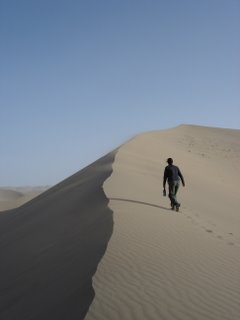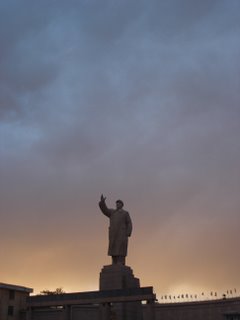
On the Move
We've been on the road a lot since Lhasa, rarely spending more than one night in the same place.
The list goes: Golmud, Dunhuang, Urumqi, Hotan (for four hours - we had to book it to Kashgar when the Hotan officials refused to renew our visas), Kashgar, Karkul, Kashgar, Urumqi, Xi'an (our current location).
Along the way, we suffered several long nights on sleeper buses. While not THAT bad, I'll pay extra for the train any day. On the bus, you get a bunk that lets a 5'11" person stretch out about three quarters of the way, knees slightly bent. At first, this seems reasonably comfortable, having spent 24 hours on a bus in Brazil without reclining seats. After a few hours, though, your body starts to complain about being squeezed into this little pod. You can't get up until the bus driver decides to stop for a bathroom break. The smoking doesn't help, either. On the bus from Urumqi to Hotan someone's kid soiled the sheets, sparking a frantic opening of windows and bringing down the bus driver's wrath on the poor parents. I've started carrying Tiger Balm on the bus to dab under my nose.
Xinjiang in My Nutshell

Northwestern China, like Tibet, feels like another country plopped inside China, which it kind of is, I guess. The Uighur, an Islamic Central Asian people, have called this region home for centuries, and their influence extends from the Islamic architectural touches to the local cuisine.
The late 1990s saw some separatist mutterings, but the gov't silenced those right quick, and followed up post-9/11 with another round of crackdowns. The Uighur independence movement doesn't rival Tibet's, and certainly lacks Tibet's international support. The Beastie Boys aren't putting on any Free Xinjiang concerts anytime soon. Xinjiang has been part of the Middle Kingdom for longer than Tibet, and appears well entrenched. The HUGE Mao statue in the middle of Kashgar puts a nice exclamation point on this (see photo, right before sand storm hits).
It's a fascinating place. We climbed giant sand dunes, ridden camels, traveled the Silk Road, spent the night with a Kyrgsh family in their yurt, and gawked at piles of bloody sheep heads at the livestock market. In Kashgar, sandstorms blow through the middle of the city (I have a photo with the flash reflecting of the billions of particles - like gritty snowflakes) and the medieval Uighur old town, with crumbling brick structures and alley mazes, is held siege on four sides by modern Chinese mid-rises. Donkey carts remain common transportation in the small towns, while Urumqi, Xinjiang's capital, boasts towering skyscrapers, freeways, an ESPRIT store, and a KFC with spotless bathrooms.
It's a region with two times (Beijing Time, used for all government functions and Xinjiang Time - two hours back - used for real life) and two languages (Uighur and Mandarin).
It also has two classes - Han Chinese occupy the sweet jobs and generally appear more affluent. We saw this dynamic played out on long-distance transit - sleeper train passengers were mainly Han Chinese, while Uighurs cram onto the more affordable sleeper bus. In fact, we've seen little Han and Uighur intermingling. The respective neighborhoods remain clearly defined in the big cities (little towns are mostly Uighur). A Romeo+Juliet tragedy needs to be made here.
Uighur Eats

Mutton pies, mutton noodles, mutton soup, mutton rice pilaf, mutton kebabs. Mutton, mutton, mutton. Mutton. I have eaten more sheep in the last couple of weeks than I will eat for rest of my life. Strangely, Jen and I began to crave standard Chinese food and steamed white rice, something I never thought I'd say in China.
But to be fair, we've enjoyed eating in Muslimland a lot. The mutton on noodles with peppers, tomato, and onions in a spicy red sauce - pretty damn good. Mutton kebabs on flatbread with a beer - what's not to like? Fresh sesame seed bagels, hot from the oven - deliciously crusty outside, soft inside. Rice pilaf with dates, raisins, and, yes, mutton - yummy. Freshly squeezed pomegranate juice from a street vendor - full of anti-oxidants! Goat entrails and skulls in greasy broth...ahh, no.
Other treats include fresh watermelon on every corner, sticky rice with syrup, fried dough and hot sweetened milk, veggie wraps (one of the few sources of vegetables in my diet lately), and more yogurt than you can shake your straw at.
Urumqi also has the most amazing night market ever, with two long blocks of food vendors calling out to you, twinkle lights overhead, and hordes of couples, friends, and families strolling by.
In terms of more exotic fare, to celebrate my bday, we had a blow out lunch at Urumqi's sole Caribbean restaurant, run by a couple from Curacao, presumably the only black people in western China. I asked the owner how she ended up here, and she shrugged, "The Caribbean was too small." Yeah, right. So you move to the most landlocked city in the world? Why not? Three words: "On the run." I expect the Colombian druglords they doublecrossed to show up any day now.
Language Trouble

I thought Brazil was tough. China is ridiculous. Fortunately, the people who we really need to speak English - visa officials, hotel staff - usually know just enough to get their message across. Otherwise, we point at characters in the Lonely Planet, pantomime, or Jen says it in Toisan/Cantonese and hopes something sticks (about 10% of the time we get lucky this way). We now try to frequent restaurants with more people because the food might be better, but also because we can look at the other tables' dishes and point at what we want. In general, we try to avoid playing Russian Roulette with the menu.
Actually, we get by ok, though occasionally hit rough spots. We spent 20 minutes in the post office in Urumqi trying to mail our warm clothes back to the US. Buying train tickets has proved a real pain in the ass. The office in Dunhuang was closed for some reason and a crowd built up waiting for the ticket lady to appear. So when she did show up, a violent rugby scrum erupted. I managed to scrawl the necessary characters on my notepad and shove my way to the front, but when she said, "ma-yo" (i.e., no tickets) I had no hope of trying to figure out when tickets might be available.* Instantly, the people behind me sensed my weakness and started yelling out their requests. (As any of you who have traveled in China know, the concept of queueing up is totally foreign here, exercised only at ATM machines.) Later, we tried buying tickets through a travel agent with limited English skills and he ended up buying us the wrong ones.
The worst part, though, is our complete inability to chat with locals. I loved shooting the shit in Peru and Argentina about anything from sports to local politics. I talked to cabbies, park rangers, people in bars. Even in Nepal most people knew enough English to have a basic discussion ("Maoists very bad. King also bad. Now no tourists."). Here we got nothing. Long train rides would be a lot more fun if we could communicate with our bunkmates.
For the most part, though, people have been incredibly patient, friendly, and accommodating about our language difficulties. A big smile and idiotic pantomiming goes a long way. Last week I tried to ask for yogurt by making mooing noises then pretending to pull on udders. The waitress loved that. We got two glasses of milk, of course.
My parents and Brian Go (if you're reading this) will be happy to know that my four years of Chinese at Xavier School and intensive Chinese tutoring under Angel Huang (from kindergarten through 3rd grade) have finally paid off. I can still count in Mandarin (ironically, I had to teach this to Jen), and recognize the symbols for man and woman - helpful in public bathrooms.
I do have some burning questions that I'd clear up if I spoke Chinese:
1. In Kashgar, two pre-teen boys stood at attention on the sidewalk, shirts off, with Uighur writing on their torsos. A small crowd clustered around them, reading the message. I know they weren't begging, though the kids did look mildly embarassed. Bizarre hazing ritual? Punished by parents? Radical advertising strategy?
2. What's with all the men gathered around talking on every street corner? This seems to be a Uighur phenomenon; haven't seen Chinese men do it yet. Are they buying or selling stuff? Or just hanging out, like an outdoor knitting circle?
3. Why do all the Chinese pop stars, male and female, wear their hair like Rod Stewart?
4. What the hell is up with the spitting? I'd been expecting it, but for god's sake. Right now, the guy next to me at the internet cafe keeps hacking up loogies and spitting them on the floor. There is a small pool of spit under his chair. Keep in mind this is a classy high tech internet cafe, not the bus station. Actually, I can live with the spitting. It's the violent throat clearing that kills me. Beijing needs to implement a " No Spitting in 2008!!" campaign or tI expect a lot of upset Olympic tourists.
Creature Comforts
John and Eric, my two Chinese American buddies had warned me that China would be tough. "You'll lose weight." "The cheap hotels will have nasty bathrooms." "People are rude."
Surprisingly, our standard of living has been higher here than in any other country thus far. Granted, we're not staying in the cheapest places, but for $10 to $15/night we get a room with private bath, cable TV, clean sheets, air con, and hot water. (I expect costs will shoot up on the East coast, especially when tourist season picks up in June.) Even in western China, the small cities were clean and modern, certainly more than Kathmandu. Thus far, people have been really nice, and we can also fly below the radar a little here; we don't stick out as much as the other foreign devils. Plus, the food has been cheap (maybe $5-10/day each) and it looks familiar and tastes good. (We can't wait to get to HK and Shanghai for dim sum and soup dumplings.) If we could speak Mandarin, traveling here would be a breeze.
Basketball Non-Sequitor
Hoops is big in China. I've seen a couple of NBA playoff games, which are broadcast in the morning live.
Bizarrely, Damon Jones, a relatively obscure player for the Cleveland Cavaliers, is sponsored by Li Ning, a Chinese sneaker brand with a logo that looks suspisciously like a certain swoosh. His photo is prominently displayed in the Xi'an store. Is he even on the Cav's starting 5?
5 comments:
Hmmm, wonder what El Cerrito will feel like 3 months from now- P
I think I'd die if I had to eat mutton. Sort of like eating deer and remembering Bambi. What do they do with all those heads? Stew? Soup? I guess no vegetarians in that part of the world. Were there no fruits? Why so little vegetables in your diet? Maybe you should have more of whatever lamb eat.
The Rod Stewart hair is easy with their straight stiff hair. Japanese rock stars do the same. Maybe it's Rod Stewart who's doing the copying. Remember the Japanese robot animation on TV when you were growing up? That came first. - Mom
I like this article! Also, check out my RedSnow site here: http://www.redsn0w.us/
supreme clothing
adidas stan smith men
coach outlet online
coach outlet store
golden goose sneakers
bape hoodie
air max 97
cheap jordan shoes
kd 12
off white clothing
nike off white
kyrie irving shoes
supreme
golden goose
jordan 4
Post a Comment